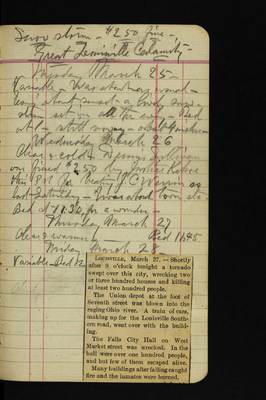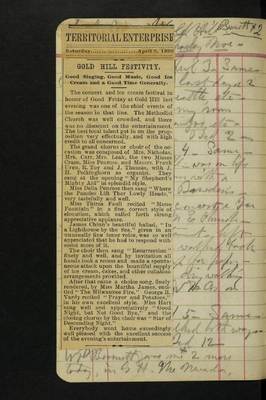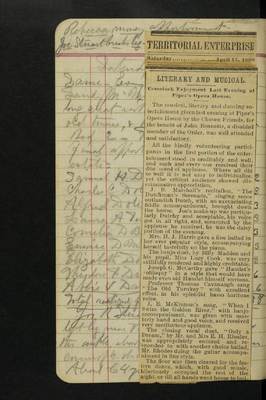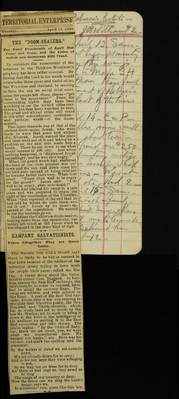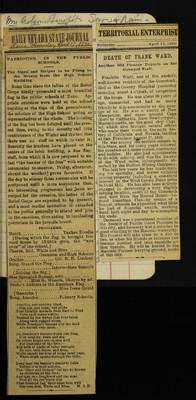Pages
65_065_c
LOUISVILLE, March 27. -- Shortly after 9 o'clock tonight a tornado swept over this city, wrecking two or three hundred houses and killing at least two hundred people.
The Union depot at the foot of Seventh street as blown into the raging Ohio river. A train of cars, making up for the Louisville Southern road, went over with the building.
The Falls City Hall on West Market street was wrecked. In the hall were over one hundred people, and but few of them escaped alive.
Many building after falling caught fire and the inmates were burned.
65_068_c
TERRITORIAL ENTERPRISE Saturday ... April 5, 1890
GOLD HILL FESTIVITY.
The concert and ice cream festival in honor of Good Friday at Gold Hill last evening was one of the chief events of the season in that line. The Methodist Church was well crowded, and there was no discount on the entertainment. The best local talent got in on the proposition very effectually, and with high credit to all concerned.
The grand chorus or choir of the occasion was composed of Mrs. Nicholas, Mrs. Carr, Mrs. Leak, the two Misses Craze, Miss Penrose, and Messrs. Frank Uren, R. Toy and J. Thomas, with J. H. Polkinghorn as organist. They sang at the opening "My Shepherd's Mighty Aid" in splendid style.
Miss Delia Penrose then sang "Where the Pansies Lift Ther Lowly Heads," very tastefully and well.
Miss Thirza Faull recited "Mono Fountain" in a fine, correct style of elocution, which called forth strong appreciative applause.
James Chinn's beautiful ballad, "In a Lighthouse by the Sea," given in an unusually fine tenor voice, was so well appreciated that he had to respond with some more of it.
The choir then sang "Resurrection" finely and well, and by invitation all hands took a recess and made a spontaneous attack upon the bountiful supply of ice cream, cakes, and other collation arrangements provided.
After that came a choice song, finely rendered, by Miss Martha James, entitled "The Milwaukee Fire." George R. Vardy recited "Prayer and Potatoes," in his own excellent style. Miss Hart sang well and appreciatively "Good Night, but Not Good Bye," and the closing chorus by the choir was "Star of Descending Night."
Everybody went home exceedingly well pleased with the excellent success of the evening's entertainment.
65_072_c
TERRITORIAL ENTERPRISE Saturday ... April 12, 1890
LITERARY AND MUSICAL.
Comstock Enjoyment Last Evening at Piper's Opera House.
The musical, literary and dancng entertainment given last evening at Piper's Opera House by the Chosen Friends, for the benefit of John Bennetts, a disabled member of the Order, was well attended and satisfactory.
All the kindly volunteering participants in the first portion of the entertainment stood in creditably and well, and each and every one received their due meed of applause. Where all did so well it is not easy to individualize, yet the critical audience showed discriminative appreciation.
J. B. Marshall's recitation, "The Dutchman's Serenade," singing some outlandish Dutch, with an excruciating fiddle accompaniment, brought down the house. Joe's make-up was particularly Dutchy and acceptable, his voice got in all right, and, measured by the applause he received, he was the daisy portion of the evening.
Mrs. H. J. Harris gave a fine ballad in her ever popular style, accompanying herself tastefully on the piano.
The banjo duet, by Billy Madden and his pupil, Miss Lucy Cook, was very skillfully rendered and highly creditable.
Joseph G. McCarthy gave "Hamlet's Soliloquy" in a style that would have made even old Hamlet himself envious.
Professor Thomas Cavanaugh sang "The Old Turnkey" with excellent effect, in his splendid basso baritone voice.
J. E. McKinnon's song, "When I Swim the Golden River" with banjo accompaniment, was given with masterly hand and good voice, and received very meritorious applause.
The closing vocal duet, "Only a Dream, " by Mr. and Mrs E. H. Rhodes, was appropriately encored and responded to with another choice ballad, Mr. Rhodes doing the guitar accompaniment in fine style.
The floor was then cleared for the festive dance, which, with good music, hilariously occupied the rest of the night, or till all hands went home to bed.
65_073_c
TERRITORIAL ENTERPRISE Tuesday ... April 15, 1890
THE "DOOM-SEALERS."
The Fatal Fourteenth of April Has Come and Gone, and the Cities of Sodom and Gomorrah Still Stand.
To outsiders the movements of the believers in the Erickson-Woodworth prophecy has been rather comical. Believing that the Lord in his wrath would ovewhelm those great and sinful cities, San Francisco and Oakland, by sending in from the sea an awful tidal wave, some 500 people left those places - "got them to the mountains." From the surrounding hights they have been watching to see the wicked cities overthrown, but they have watched in vain. The great and wicked cities still stand to the utter astonishment, confusion -- and perhaps wrath -- of the doom-sealers.
This fiasco reminds one of that of the ancient doom-sealer Jonah, who went forth to warn that great and wicked city, Nineveh. Jonah warned the place and then went out of it and taking up a position on the east side made him a booth. There he sat down to see what would become of the city. And when nothing happened, it "displeased Jonah exceedingly, and he was very angry."
When the gourd which had sheltered the head of the irate prophet was cut down and the sun beat down upon his old bald pate instead of being subdued he became hotter than ever. When God asked: "Doest thou well to be angry for the gourd?" Jonah said: "I do well to be angry, even unto death!"
Jonah had pitched his camp in a safe place and was prepared to enjoy the sight of the destruction of the Ninevites. When "God repented of the evil that he had said he would do unto them, and did it not," Jonah by no means approved of the repentance. He wanted to see the business go on.
Doubtless the California doom-sealers, looking down from the mountains, yesterday felt much as did Jonah when he was engaged in the same kind of vigil.
TERRITORIAL ENTERPRISE Tuesday ... April 15, 1890
RAMPANT SALVATIONISTS.
Taken Altogether They are Queer Cattle.
The Nevada City (Ca.) Herald says there is likely to be war in earnest in that town because of the soldiers of the Salvation Army trying to force upon the people their paper, called the War Cry. A funny thing about the Salvationists comes from England. In London, among the East End cockneys, the Salvationists, in order to succeed, have had to adopt the cockney lingo. The songs are written and even printd in this lingo. A poet of the East End barracks, whose duty it was one evening to elucidate that beautiful psalm, the One Hundrd and Thirty-seventh, which has so finely been set to music by the late Mr. Wesley, set to work to bring it down to the level of the intelligence of his auditors by putting it in the East End vernacular and into rhyme. The psalm begins: "By the rivers of Babylon, there we sat down, yea, we wept when we remembered Zion. We hanged our harps," etc. Here was his version, and mark the spelling and the grammar:
By the waters of Babel we sot oursells down, We sot oursells down for to croy; And as for our 'arps they were wringing 'o wet, So we 'ung 'em on trees for to droy. An' them as had copt us, they arsed us to sing The songs of our country so dear; How the deuce can we sing the Lord's songs, says we, In a bloomin' rum place like this 'ere.
65_075_c
DAILY NEVADA STATE JOURNAL Reno, Nevada April 17, 1890
PATRIOTISM IN THE PUBLIC SCHOOLS.
The Stars and Stripes to be Flung to the Breeze from the High School Building.
Some time since the ladies of the Relief Corps kindly presented a most beautiful flag to the public schools of Reno. Appriate exercises were held at the school building at the time of the presentation; the scholars of the High School acting as representatives of the whole. The hoisting of the flag has been delayed until the present time, owing to the severity and long continuance of the Winter and the fact that there was no staff on which to raise it. Recently the trustees have placed on the centre of the brick building, a fine flagstaff, from which it is now proposed to un-furl "the banner of the free" with suitable ceremonies to-morrow, Friday, afternoon, should the weather prove favorable. If the day be stormy these ceremonies will be postponed until a more auspicious time. An interesting programme has been arranged for the occasion, the ladies of the Relief Corps are expected to be present, and a most cordial invitation is extended to the public generally to attend and join in the exercises, thus aiding in inculcating patriotism in the juvenile breast.
PROGRAMME.
March...Yankee Doodle [During which the flag is brought forward borne by 13 little girls, the "wee ones" of the school.] Chorus, Red, White and Blue...Grammar and High Schools Oration...Col. R. H. Lindsay Song, Guard the Flag...Intermediate Schools [Raising the flag.] Star Spangled Banner, solo...Miss G. Wasson, Chorus by all. Drake's Address to the American Flag...Miss Irene Gould [Remarks.] Song, America...Primary Schools.
America, our country blest, Our joy, our hope, our pride That broadly spreads from East to West Unto each ocean's side. Washed by the waves that ever break Along each rugged shore, While Freedom's breezes o'er the land Are wafted ever more.
On Freedom's breezes floats our Flag, O'er country, town and sea; Its colors bright are chosen well For emblems of the free.-- Red tells of deeds of valor wrought By men both brave and true, White stands for love of home most pure, While truth speaks through the blue.
Long may our banner's graceful folds Unfurl o'er land and sea, The "Stars and Stripes" for aye be known As emblems of the free. And may our daughters and our sons Feel all the rev'rence due That honored flag their sires love well Our own Red, White and Blue.
M. S. D.
TERRITORIAL ENTERPRISE Saturday...April 19, 1899
DEATH OF FRANK WARD.
Another Old Pioneer Departs on the Outward Trail.
Franklin Ward, one of the ancient, well-known residents of the Comstock, died at the County Hospital yesterday morning about 4 o'clock, of congestion of the lungs. He was about 60 years of age, unmarried, and had as many friends in this community as the average of us. He was a native of New Hampshire, and came around Cape Horn to California from Newburyport, Massachusetts, on the good ship Capitol, which also brought several others who made their mark in the early history of California and Nevada, landing at San Francisco August 17, 1849.
He was among the earliest comers to this State, and for many years followed his vocation as a stone mason, contractor and builder. He also had considerable to do with mining, and was the locator of the Ward mine, subsequently absorbed by the Bullion Mining Company.
The last few years he has made mining his specialty, and leaves valuable mining property, including a one-third interest in the West Crown Point mine in Gold Hill. He has also been actively engaged in developing a very eligible mining location, south of the Comstock and west from the Mound House -- beyond American Flat -- by means of a tunnel, wherein he expended what little he had of financial wealth, working hard, both night and day to accomplish his ends.
Deceased was a prominent member of the Society of Pacific Coast Pioneers in this city, and formerly was a member in good standing in the Masonic fraternity. His funeral will take place in a day or two, or when his friends or relatives can become notified and take requisite action therein. He will be buried in the Masonic-Pioneer burying ground, north of this city.
